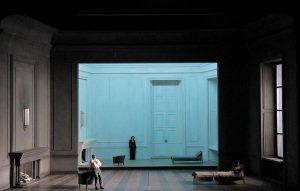Otello in der Bayerischen Staatsoper
Von Karin Zander
04.12.2018
Jubel in München über einen einzigartigen Otello.
Die Behauptung sei gewagt: Radikaler ist Jonas Kaufmann noch nie in einen Charakter hinein gestiegen, dramatischer hat er sich noch nie zuvor aufgelöst in den Abgründen einer Rolle – und bewegender war seine Gesangskunst noch nie zu erleben. Dieser Otello ist tatsächlich die Krönung seiner bisherigen Entwicklung. Kein Ton bleibt emotional angefüllt, kein ist Ausdruck zufällig, keine Bewegung privat. Kaufmanns Otello ist entsetzlich lebensecht und wird in erschreckender Weise bis zur letzten Sekunde emotional verständlich.
Getragen von Kirill Petrenkos durchlässiger, teils filigraner, teils mit hochdramatischem Furor dirigierter Musik und eingebettet in die sensible Regie von Amelie Niermeyer im psychologisch durchdachten Bühnenbild von Christian Schmidt, können Jonas Kaufmann ,Anja Harteros und Gerald Finley über die Grenze gehen, die so oft die Kunst auf der Bühne von dem wahrhaftigen Leben trennt.
Die dankbarste Rolle in diesem Trio infernal hat natürlich der richtige Bösewicht Jago. Finley zieht alle Register und legt ein komödiantisch-gesangliches Bravourstück ab. Er ist der Strippenzieher, der zwar ein klares egoistisches Motiv hat, aber darüber hinaus den mephistophelischen Genuss an seiner zerstörerischen Macht genießt. Seine helle klare Bariton-Stimme ist passgenau für die Rolle.
Anja Harteros, eine Desdemona, wie man sie sich gesanglich und optisch nur träumen kann und Jonas Kaufmann gehen andere Wege. Nichts Bravouröses ist in ihrem Spiel, sie legen keinen Wert auf äußeren Glanz ihrer Arien und Duette, sondern begeben sich in die Spirale des Grauens, echt, ungeschützt und wahr.
Führend ist, wie sollte es anders sein, Otello, der „Löwe von Venedig“. Doch dieser Löwe hat kein schützendes Fell, ist nackt und verwundet, sobald er aus dem öffentlichen Raum in die Privatheit tritt. Gerade noch hat er – mit voller klangschöner Stimme- sein „Esultate“ (was so in etwa „Freut euch“ bedeutet) seinem Volk zugerufen, da ist er auch schon aus dem stärkenden Zusammenhalt seiner soldatischen Erfolge heraus gefallen und von den Gespenstern seines Lebens gefangen genommen. Nichts in diesem Leben ist gewiss, nichts ist in Wirklichkeit groß und strahlend und genau das macht auch die äußere Erscheinung Kaufmanns in dieser Rolle deutlich. Mögen ihm auch noch so viele Orden an eine glänzende Uniform geheftet sein, hier sieht man nur den Menschen ohne sein Kostüm. Abseits des Krieges ist er der unscheinbare Mann, der eine einzige Sehnsucht hat: durch den Kuss seiner Frau zu wissen, dass er, der Außenseiter, der Nicht-Dazugehörige, angenommen ist.
Otellos Sicherheit gründet nicht auf Kriegserlebnissen, deren traumatische Erfahrungen ihn zerstört haben, sondern auf der Hoffnung, durch die überirdische, absolute Liebe im Leben gehalten zu werden. Das berühmte Liebesduett – was für eine Musik! – im ersten Akt beschreibt die Katastrophe dieser Liebe, die auf nichts Gleichem beruht, sondern ausschließlich von seiner irren Sehnsucht nach Geborgenheit und ihrer ebenso irrigen Idee, ihn durch Mitleid und Liebe zu erlösen, zusammen gehalten wird. Wunderbar inszeniert die schreckliche Ferne, die diese gegenseitige Sehnsucht nacheinander aussichtlos macht. Hier ist kein Glück zu finden und es wird niemals ein Glück geben. Einzig in der sexuellen Umarmung, die am Ende dieses Bildes auf dem mit gutem Grund durch das ganze Stück hindurch präsenten Bett angedeutet wird, kann das Gemeinsame die Qual überdecken. Desdemonas absolute Hingabe ist Otellos Unterpfand für Treue und Zugehörigkeit.

Jonas Kaufmann (Otello), Anja Harteros (Desdemona), „Otello“, Bayerische Staatsoper München, Foto: Willy Hoesl
Und genau hier, an dieser Stelle, beginnt Jago sein Werk der Zerstörung.
Otello liegt erschöpft auf seinem Bett, als Jago ihm den ersten Stich des Mistrauens gegen Desdemona einimpft. Und als wäre ein Schalter umgelegt, richtet Otello sich auf. In diesem Moment verliert er seinen Kompass. Als würde er den Zug wechseln, der ihn unweigerlich ins Verderben führen wird, kann er dem Wahn , der ihn immer mehr umfängt, nichts mehr entgegen setzen. Aus dem kleinen Stich der Angst wird immer mehr eine innere Qual, die keine Verbindung zur Realität mehr hat. Am Beginn dieses Weges in das Nichts zeigt Kaufmann, dass er noch Funken seines eigentlichen Wesens spürt, er ist zerrissen und schwach. Er will er selbst bleiben, er kämpft um seine Seele . Doch Mephisto lässt ihm keine Chance. Wahn, Wahn, nichts als Wahn! möchte man diesem entsetzlichen Menschen mit Wagner zurufen. Doch ihn erreichen keine Worte der Liebe von Desdemona mehr. Otello gerät ausser sich, wird verrückt aus dem Zusammenhang der menschlichen Ordnung, zu der er gehören wollte.
Ist das böse? Ist das krank? Jonas Kaufmann spielt und singt – und in dieser Rolle kann man sich keine andere Stimme nach ihm mehr vorstellen – einen Mann, der nur ein einziges Ziel noch hat: die Qual, diese grauenhafte Qual der Eifersucht, die ihn zerstört, muss ein Ende haben. Er muss sie beseitigen, diese Schlange, an die sich seine ganze Hoffnung geklammert hat. Er zerbricht und findet nur in der Zerstörung eine Überlebenshoffnung. Das Aufatmen nach der Tat ist auch das Ende des Wahns. Es hätte der Aufklärung nicht bedurft, denn niemals hätte Otello danach mit dieser Schuld leben können.
Strindberg? Bergman? Oft wurden sie bemüht in den Premierenkritiken. Ich denke, das führt nicht weit genug. Was Jonas Kaufmann und Anja Harteros hier zeigen, ist die Katastrophe der Menschheit schlechthin, die Schlange im Paradies, die Geschichte von Kain und Abel, fortgeschrieben in unsere Zeit. Das Böse als Urgewalt, der Wahn als Zerstörung der Menschheit. Größer und tiefer geht es nicht. Dieser Otello hat keine Chance. Er wurde zerstört, längst bevor wir ihn kennen lernten. Und auch Desdemona hat keine Chance, denn menschliche Liebe reicht nicht aus, um dieses seelische Grauen zu heilen.
Amelie Niermeyer gehört meine Bewunderung für ihre konsequente – wenn auch in einigen Details nicht auf den ersten Blick immer verständliche – Interpretation. Ihr gebührt vor allem der Dank dafür, Jonas Kaufmann einen Ansatz zu geben, mit seiner einzigartigen Stimme einen nie da gewesenen, für immer bleibenden, endlich begreifbaren Otello geschaffen zu haben.
Der Jubel wollte kein Ende nehmen – die Stars auf der Bühne strahlten. Und doch blieb das Erschrecken über die Abgründe es Menschen noch lange tief in den Knochen sitzen. Man möchte nun doch Strindberg zitieren: „Es ist schade um die Menschheit.“
„Otello“ von Guiseppe Verdi
Uraufführung am 05.02.1887 in der Mailänder Scala
Premiere in der Bayerischen Staatsoper am 23.11.2018
Musikalische Leitung: Kiril Petrenko, Inszenierung: Amélie Niemeyer, Bühne: Christian Schmidt
Mit:
Otello: Jonas Kaufmann, Desdemona: Anja Harteros, Jago: Gerald Finley, Cassio: Evan Leroy Johnson, Roderigo: Galeano Salas, Lodovico: Bálint Szabó, Montano: Milan Siljanov, Ein Herold: Markus Suihkonen, Emilia: Rachael Wilson
Nächste Vorstellungen am: 6., 10., 15. und 21. Dez. 2018
Unsere Bilderserie von der Produktion mit 10 Fotos:

10 Photos: Jonas Kaufmann (Otello), Anja Harteros (Desdemona), „Otello“, Bayerische Staatsoper München, Foto: Willy Hoesl
english text
Otello at the Bavarian State Opera
By Karin Zander
04/12/2018
Exultation in Munich about a unique Otello.
The claim is daring: more radically Jonas Kaufmann has never climbed into a character, he has never been more dramatically dissolved in the abysses of a role – and his vocal art has never been more moving. This Otello is actually the culmination of his previous development. No sound remains emotionally unfilled, no expression is random, no movement is private. Businessman Otello is terribly lifelike and becomes emotionally understandable to the last second in a terrifying way.
Carried by Kirill Petrenko ’s permeable, partly filigree music, partly with highly dramatic furor, and embedded in the sensitive direction of Amelie Niermeyer in the psychologically thought – out stage set by Christian Schmidt, Jonas Kaufmann, Anja Harteros and Gerald Finley can cross the border, which so often the Art on stage separates from true life.
The most thankful part in this infernal trio of course is the right villain Iago. Finley pulls out all the stops and puts on a comedic-singing bravura piece. He is the Strippenzieher, who has a clear selfish motive, but also enjoys the Mephistophelischen enjoyment of its destructive power. His bright clear baritone voice is perfect for the role.
Anja Harteros, a Desdemona, as one can only dream about her vocally and visually, and Jonas Kaufmann take other paths. There is nothing bravura in their game, they do not care about the outer splendor of their arias and duets, but they enter the spiral of horror, real, unprotected and true.
Leading, how could it be otherwise, Otello, the „Lion of Venice“. But this lion has no protective coat, is naked and wounded as soon as he steps out of public space into privacy. Just now he has – in full beautiful sound voice – his „results“ (which means something like „rejoice“) called his people, he has already fallen out of the strengthening cohesion of his soldierly successes and caught by the ghosts of his life taken. Nothing in this life is certain, nothing is really big and radiant, and this is exactly what makes the outward appearance of Kaufmann in this role clear. Even if so many medals are attached to a shiny uniform, here you only see the man without his costume. Away from the war, he is the inconspicuous man who has one longing: to know, through the kiss of his wife, that he, the outsider, is the non-
Associated, is assumed. His safety is not based on war experiences whose traumatic experiences have destroyed him, but on the hope of being held in life by supernatural, absolute love. The famous love duet – what a music! – in the first act describes the catastrophe of this love, which is based on nothing the same, but only by his crazy desire for security and their equally erroneous idea to redeem him through compassion and love, together. Wonderfully staged the terrible distance, which makes this mutual longing one after the other futile. There is no luck here and there will never be happiness. Only in the sexual embrace, indicated at the end of this picture on the bed that is present for good reason through the whole piece, can the shared cover the agony. Desdemona’s absolute dedication is Otello’s pledge of loyalty and belonging.
And right here, at this point, Iago begins his work of destruction.
Otello lies exhausted on his bed when Iago injects him with the first stab of mistrust of Desdemona. And as if a switch had been turned down, Otello straightened up. At this moment he loses his compass. As if he would change the train, which will inevitably lead him to ruin, he can no longer oppose the delusion that surrounds him more and more. From the small sting of fear becomes more and more an inner torment, which no longer has any connection to reality. At the beginning of this path into nothing, Kaufmann shows that he still feels sparks of his true nature, he is torn and weak. He wants to stay for himself, he fights for his soul. But Mephisto does not give him a chance. Delusion, delusion, nothing but delusion! One would like to call this horrible man with Wagner. But no words of desdemona’s love reach him any more, those with their naive imagination. Otello gets out of hand, is moved by the context of the human order he wanted to belong to.
Is that bad? Is that sick? Jonas Kaufmann plays and sings – and in this role you can not imagine another voice after him – a man who has only one goal left: the torment, the horrible torment of jealousy that destroys him, must come to an end. He has to get rid of her, that snake to which all his hope has clung. He breaks up and finds only in the destruction a hope of survival. The relief after the act is also the end of the delusion. It would not have needed the Enlightenment, because Otello could never have lived with this guilt afterwards.
Strindberg, Bergman? Often they were tried in the premiere reviews. I think that does not lead far enough. What Jonas Kaufmann and Anja Harteros are showing here is the catastrophe of humanity par excellence, the serpent in paradise, the story of Cain and Abel, written down into our time. The evil as elemental force, the delusion as destruction of humanity. It does not get bigger and deeper. This Otello has no chance. He was destroyed long before we met him. And also Desdemona has no chance, because human love is not enough to cure this mental horror.
Amelie Niermeyer understands my admiration for her consistent – albeit in some details not always understandable at first glance – interpretation. Above all, it deserves our thanks for giving Jonas Kaufmann an approach to creating an unprecedented, forever-lasting, finally comprehensible Otello with his unique voice.
The jubilation did not want to end – the stars beamed on stage. And yet the horror of this just experienced truth long deep in the bone. One would like to quote Strindberg: „It is a pity about humanity.“
„Otello“ by Guiseppe Verdi
World premiere on 05.02.1887 at the Milan Scala
Premiere at the Bavarian State Opera the 11th of December 2018
Musical direction: Kiril Petrenko, Director: Amélie Niemeyer, Stage Design: Christian Schmidt
With:
Otello: Jonas Kaufmann, Desdemona: Anja Harteros, Jago: Gerald Finley, Cassio: Evan Leroy Johnson, Roderigo: Galeano Salas, Lodovico: Bálint Szabó, Montano: Milan Siljanov, A Herald: Markus Suihkonen, Emilia: Rachael Wilson
Next performances on: 6th, 10th, 15th and 21st of December 2018
Author: Karin Jacobs-Zander
Karin Jacobs-Zander, Dramaturgin und Autorin der Bücher „Lebenslotsen“ und „Wo München am schönsten ist“ aus dem Ellert & Richter Verlag, lebt in München als freie Journalistin










